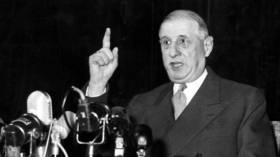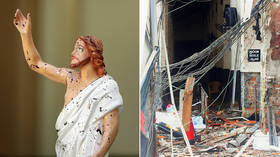50 years on, the world, and not just France, still misses Charles de Gaulle

French President Charles de Gaulle stepped down 50 years ago this week after his proposals for constitutional reform were defeated in a national referendum. What we could do with a leader like the 'General' today.
"I cease to exercise my functions as president of the Republic. This decision takes effect today at midnight." And so, on April 28, 1969, the most successful decade in France's modern history ended.
Charles de Gaulle had come out of retirement in 1958 to try and save his country for a third time. He had fought in the trenches in World War I. He had led the anti-Nazi Free French in World War II. Then, at the age of 67, he answered the call to solve the grave crisis of confidence facing the Fourth Republic.
Commonly regarded as a conservative figure, economically de Gaulle was a man of the left. He believed in a 'dirigiste' economy with a high level of public ownership. He didn't kowtow to the bankers and international finance capital. "He was a man who did not care for those who owned wealth; he despised the bourgeois and hated capitalism" was the verdict of his French biographer Jean Lacouture.
The years of de Gaulle's presidency (1959-69) are remembered with great affection in France today and it's hardly surprising. It was a time of enormous optimism. There were ambitious engineering and infrastructure projects. New motorways were built. A space program was developed. In March 1969, one month before de Gaulle stepped down, Concorde, the world's first supersonic airliner, a joint project between France and Britain, made its first test flight.
In 1962, the Organization for Economic Co-operation and Development (OECD) lauded the "extraordinary vitality" of the French economy. In 1964, France's GDP growth was 6.4 percent. In the third quarter of 1968, it reached an all-time high of eight percent. Compare that to the figure of 0.3 percent growth in the fourth quarter of 2018. De Gaulle combined left-wing economic policies with moderate social conservatism, a winning left-right mix with voters because it's where the real center of public opinion actually is.
If somebody wants to start a new political party they should make it economically left and culturally right. That’s the big unserved group in America right now. https://t.co/9BWVlEz7CN
— David Brooks (@nytdavidbrooks) April 5, 2019
That's forgotten today, by politicians of the right who embrace finance capital-friendly neoliberalism even though it corrodes society and creates enormous inequalities, and those on the left who believe identity politics, social liberalism and an excessive political correctness trumps all other concerns (no pun intended). It's the absence of 'Gaullism' from the options available that helps explain the rise of the far-right. When de Gaulle was around, such groups were marginalized. Jean-Louis Tixier-Vignancour, for instance, a forerunner of Jean-Marie Le Pen (who was in fact one of his campaign managers), received just 5.2 percent in the first round of the 1965 presidential elections – compared to de Gaulle's 44.65 percent.
The General was a patriot but he was also an anti-imperialist. He took France out of Algeria. He pulled his country out of NATO's military command. He fiercely criticized the US' involvement in the Vietnam war, denouncing "the bombing of a small people by a very large one." He was one of the first, if not the first, Western leaders to criticize Israel's treatment of the Palestinians. He supported detente with the Soviet Union, talking in 1966 of a 'new alliance of France and Russia,' and believed in a Europe of nation states that stretched to the Urals. He famously twice blocked Britain's entry into the EEC not because he was anti-British, but because he feared that allowing the UK in would be the same as inviting in the US. "He refused the division of the world into two blocs, the world he said was too rich for that, and Paris would play its full part in developing new relationships," writes biographer Jonathan Fenby.
Again, compare de Gaulle's support for multi-polarity and national sovereignty with the globalist/Atlanticist one favored by most European leaders since then.
Also on rt.com Yellow Vests take to the streets in rejection of Macron’s ‘rubbish’ olive branch (PHOTO, VIDEO)Can we seriously imagine de Gaulle accepting directions from hawks in Washington which were clearly injurious to the economic interests of his country? If the Americans had threatened to impose secondary sanctions on French companies for doing business with Iran in the General's time, he would have taken the next flight to Tehran with French business leaders to set up new deals. He'd have done the same regarding the sanctions on Russia. That's how he responded to those who tried to get him to act against France's national interests.
For the anti-sovereigntists, de Gaulle was a pain in the derriere. It's revealing to see, as I noted in an earlier OpEd here, how sympathetic the CIA was to the Trotskyists and ultra-leftists who protested against de Gaulle in 1968.
France has gone backwards in many ways since the de Gaulle era, which was also a golden age for music and the arts. Every president seems to turn out worse than the one before.
Nadir has surely been reached in the presidency of Macron, a neoliberal ex-investment banker whose capital-friendly 'reforms' have led to the rise of the Gilets Jaunes movement.
With amazing effrontery last October, Macron told his people to stop complaining and be more like de Gaulle, after a meeting with a pensioner who complained he only had a small pension. This is the same Emmanuel Macron who accused his own people of being as "Gauls who are resistant to change" on a visit to Denmark.
Also on rt.com Why Macron's ‘letter to Europe’ is spectacularly clueless & will fall on deaf earsThe truth is that the French people today have a lot to complain about. Macron's policies are in fact, the reverse of de Gaulle's. The General 'did not care for those who own wealth.' Macron doesn't seem to care for anyone else.
Another big difference between de Gaulle and the politicians of today was his attitude to money. Has there ever been such an uncorrupt leader? As I noted in 2008, "Despite occupying the highest office in the country for a decade, he died in relative poverty. Instead of accepting the pension he was entitled to as a retired president and general, he only took the pension of a colonel. The contrast between de Gaulle and the money-obsessed career politicians of today could not be greater." Jonathan Fenby relates how, as president, de Gaulle even insisted on paying for his phone calls and the electricity bill for his quarters in the Elysee Palace.
De Gaulle could easily have become a dictator given his popularity, but he was too good for that. As a democrat, he understood that politicians and political parties actually hindered democracy. He much preferred to consult his people directly, via referenda. One of his most famous attributed quotes, in response to Clemenceau's jibe that war was too serious a matter to be left to the military, was "Politics is too serious a matter to be left to the politicians."
Haven't the past 50 years proved him right on this and indeed everything else?
Follow Neil Clark @NeilClark66 and @MightyMagyar
Think your friends would be interested? Share this story!
The statements, views and opinions expressed in this column are solely those of the author and do not necessarily represent those of RT.















